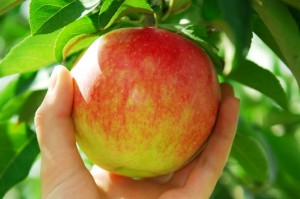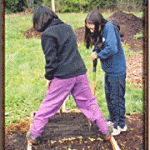THINK AND EAT GREEN: A COMMUNITY-UNIVERSITY RESEARCH ALLIANCE
Bringing together the Vancouver School Board with the Land and Food Systems Faculty to enhance food security in Vancouver’s schools
Description (including that we have two Education grad students involved in the project)…
Check out this UBC Public Affairs article on the project: Think & Eat Green @ School
 INTERGENERATIONAL LANDED LEARNING PROJECT
INTERGENERATIONAL LANDED LEARNING PROJECT
The Intergenerational Landed Learning on the Farm for the Environment Project is a unique Faculty initiative that brings together children, educators, and retired local farmers to explore how participation in a farming/gardening project on an urban farm can foster environmental consciousness, respect for nature, and an understanding of food-land issues. Through this project we are investigating the ways young people develop a better understanding and appreciation for the land and learn how to care for the earth through working with the soil and growing plants in an apprentice type relationship with community farmers who can model environmentally responsible practices.
This project is designed to re-imagine and re-construct the farm experience among community farming elders and middle school children to promote environmental stewardship and intergenerational learning. It brings together school children within British Columbia’s Lower Mainland, their teachers and volunteer farmers, representing the significant farming area of the Fraser Valley, as “Farm Friends” to plan, grow, and harvest food on an urban farm. All project activities take place at UBC Farm . (http://cust.educ.ubc.ca/projects/landedlearning.html)
For more information contact Dr. Jolie Mayer-Smith at jolie.mayer-smith@ubc.ca, or Dr. Linda Peterat at linda.peterat@ubc.ca

DISCURSIVE APPROACHES TO TEACHING AND LEARNING ABOUT SOCIAL ISSUES
Collaborative Research on the Experiences of Teacher Educators and Beginning Teachers, SSHRC Funded ResearchCurrent global politics, environmental concerns, and incidents of school violence continue to contribute to an expanding focus on socio-ecological issues as can be seen in the recent mandates of Canadian schools. However, alongside this emphasis on socio-ecological issues in K-12 education, there is growing concern that efforts at educational “neutrality” work against the in-depth examination of issues needed to profoundly engage students in learning. Educational theorists have begun to address this dilemma, exploring how recent shifts in understandings of knowledge and identity in the social sciences might be integrated into teaching practices, and indeed, whether they might provide more successful access points for teaching and learning about socio-ecological issues than a presumption of educational neutrality.
This three-year study (2005-2008) will involve approximately 10 teacher educators from across the country who are working with discursive approaches to knowledge, as well as a number of the beginning teachers they have worked with. Teacher educators and beginning teachers involved in the study will participate in ongoing action research inquiry into the relationships between their practice and espoused theories. A mixed genre representation will bring data from this research to the broader public, examining how recent shifts in understandings of knowledge and identity are being addressed in practice, and whether these efforts provide helpful access points for teaching about socio-ecological issues.
For more information go to www.otherwise-ed.ca/Pages/Projects/DiscursiveTL/ or contact Dr. Marcia McKenzie at mckenzia@interchange.ubc.ca
